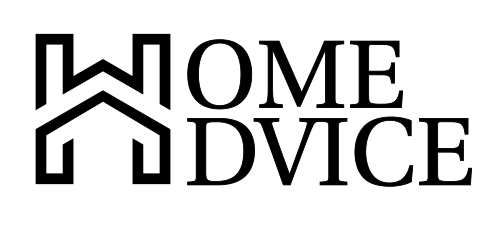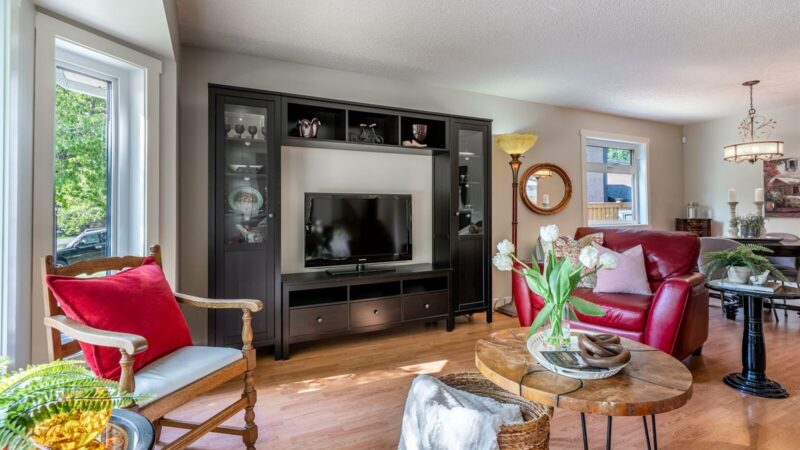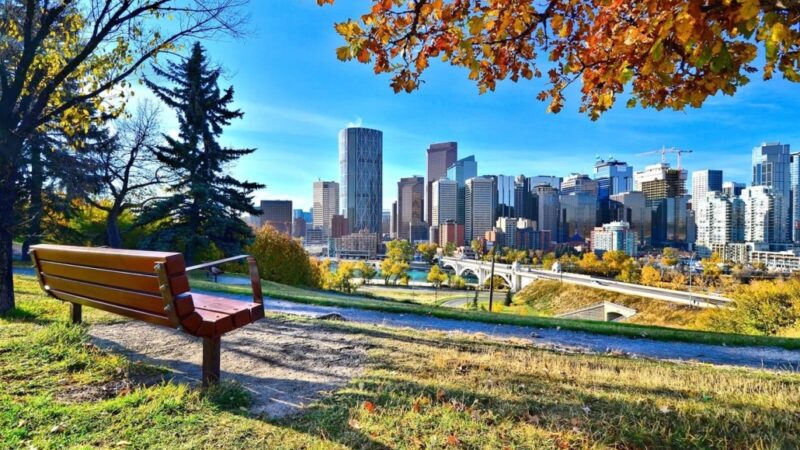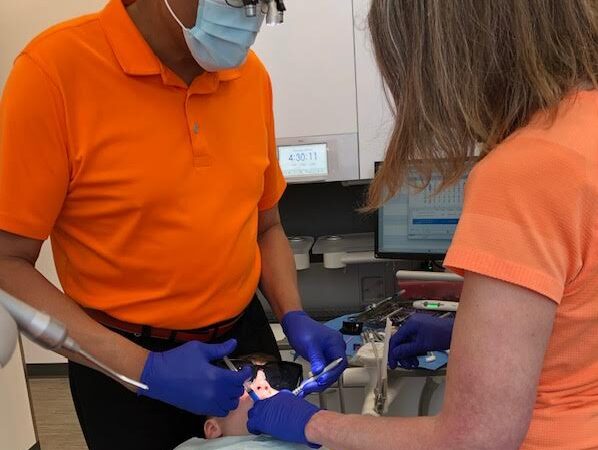How to Detect Plumbing Leaks in West Kelowna, BC

Plumbing issues in West Kelowna, BC, can be a nuisance, especially when they lead to costly water damage. Detecting leaks early can save both money and stress. This guide will walk you through the signs of plumbing leaks and how to effectively identify them.
Recognizing the Signs of Plumbing Leaks: Tips from a Plumber in West Kelowna
Detecting a plumbing leak early can be the difference between a quick fix and a full-blown, wallet-draining ordeal. Let’s talk about some common tell-tale signs that might signal a hidden leak, so you can call your friendly neighborhood plumber in West Kelowna before things get out of hand.
1. Unexpected Increases in Your Water Bill
Ever scratched your head after receiving a water bill that seemed like you were filling a pool daily? Yeah, me too. If your water usage habits haven’t changed but your bill skyrockets, it could be a silent scream for help from a leak in your system. It’s like your wallet is slowly leaking, drop by drop.
2. The Mysterious Case of the Running Water Sound
It’s the middle of the night. Everything is silent. Then you hear it – the sound of running water. No, it’s not a ghost taking a midnight shower. If all your taps are off and you still hear water, it’s time to play detective or better yet, get a plumber from West Kelowna on the case.
3. Musty Smells and Unwanted Mold Parties
Walk into a room and greeted by a musty odor that no amount of air freshener can combat? Mold and mildew are not just bad for your health; they’re party flags for unwanted moisture from leaks. Often, these leaks are hidden behind walls or under floors, sneaky little things.
4. The Case of the Mysterious Wet Spot
If you ever find a puddle where no puddle should be, or if your carpet squelches underfoot, you’ve got a problem. Water stains on ceilings or walls are like arrows pointing to a leak in disguise. It’s nature’s way of telling you to call a professional.
5. Hearing the Call of the Drip
That constant ‘drip, drip, drip’ sound can be as annoying as a mosquito by your ear at night. Faucets or showerheads that drip despite being firmly turned off are crying out for a new washer or possibly more complex repairs from a skilled West Kelowna plumber.
6. The Water Meter Never Lies
Here’s a little plumber’s trick: check your water meter, turn off all water in your house, and then check it again in about an hour. If it’s moved, congratulations, you’re leaking water somewhere. It’s like a game of hide and seek with your pipes, and trust me, it’s a game you want to win quickly.
7. Foundation Cracks: More Serious Than Your Average Wrinkle
Seeing cracks in your foundation can be as unsettling as discovering wrinkles in your favorite leather jacket. These cracks can be the result of water damage from leaks, leading to structural damage that’s as serious as it sounds.
Pinpointing Trouble Spots: Common Areas for Leaks in Your Home
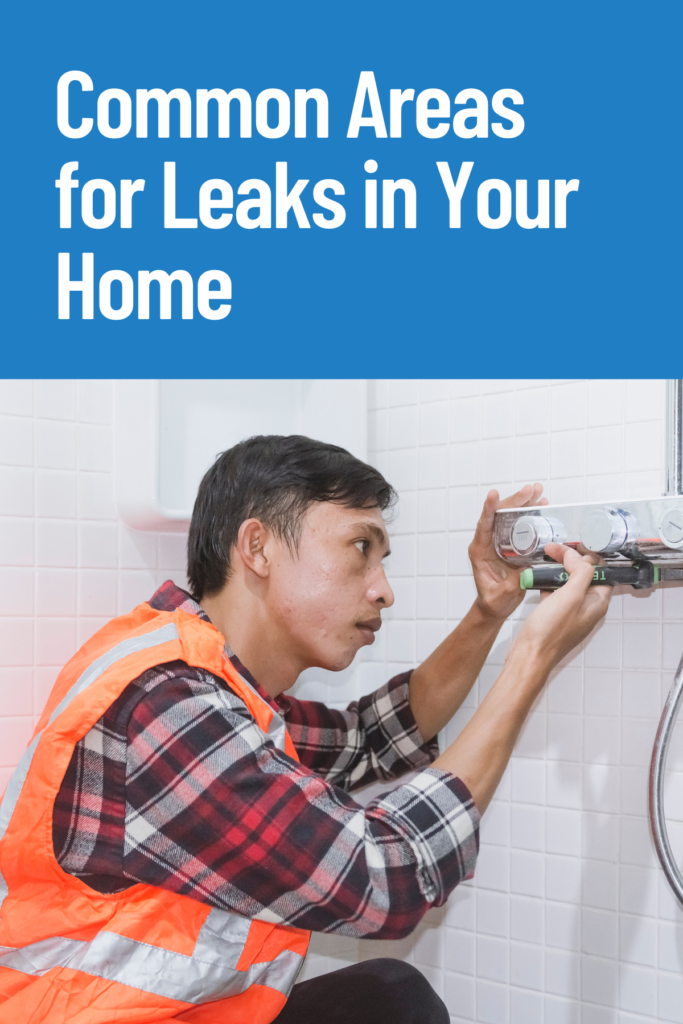
Let’s walk through some of the most notorious spots where leaks love to hide, and how you can spot them before they turn into a homeowner’s nightmare.
Kitchen Capers: Where Leaks Love to Cook Up Trouble
Think about the last time you ventured under your kitchen sink. Maybe it was to grab a garbage bag or hastily stash some cleaning supplies. It’s a place we often overlook until there’s a puddle, and suddenly, it’s the center of attention. Leaky pipes, dripping faucets, or the notorious under-sink invasion can turn your storage space into a swamp
Bathroom Blues: Showers and Sinks Singing the Drip Drop Tune
Ah, the bathroom—home to some of the most persistent leaks. Did you ever notice how a dripping faucet seems to mock you with its relentless ‘plink, plink’? It’s like it knows just how annoying it is. Showers, toilets, and under-sink pipes in bathrooms are prime real estate for leaks. A toilet that runs when not in use is basically flushing your money down the drain.
Basement and Utility Room Riddles: The Mystery of the Hidden Leak
Basements and utility rooms are often out of sight and out of mind, until you step into a puddle in your socks—nobody enjoys that. Water heaters, sump pumps, and washing machine hoses are like the secret agents of leaks, working undercover until they decide to blow their cover with a flood.
Outdoor Odyssey: When Nature and Pipes Collide
Let’s step outside for a moment. Hose bibs, irrigation systems, and those mysterious pipes that disappear into your garden are often overlooked warriors against leaks. An overenthusiastic garden hose can silently wreak havoc on your water bill. Listen for the hiss of a small leak next time you’re out tending to your petunias, or you might find your garden is getting more watered than you planned.
Garage Chronicles: More Than Just Car Secrets
And what about the garage? It’s not just a haven for your tools and cars; water supply lines run through here too. These lines to outdoor faucets or sprinkler systems can start dripping quietly behind the scenes, often unnoticed while you’re busy tuning up your car or searching for that lost screwdriver.
DIY Leak Detection Techniques: Handy Tips from Your Plumber in West Kelowna
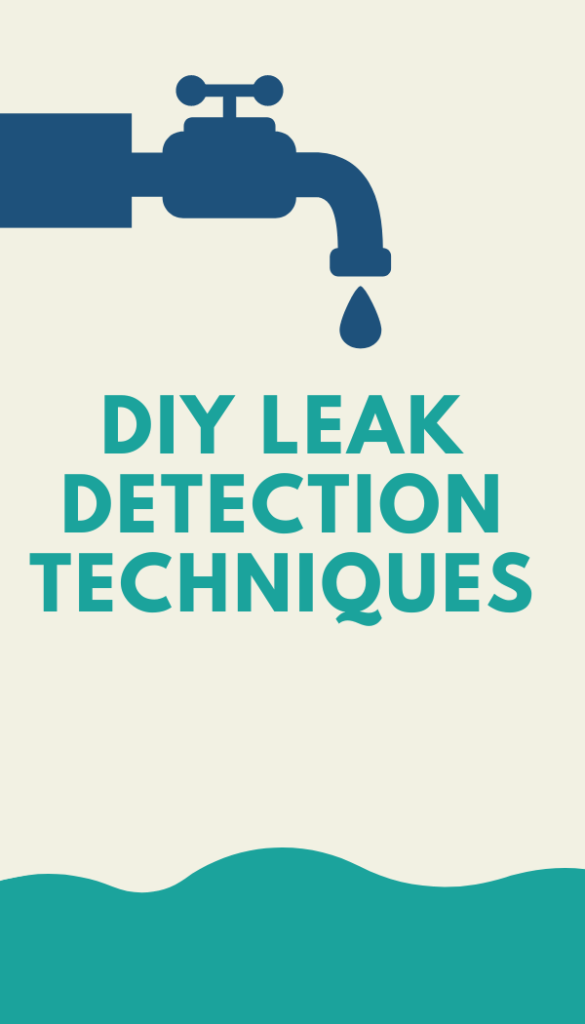
Meter Check Method: Playing Detective with Your Water Meter
One of the simplest ways to tell if you have a leak is by using your water meter. First, make sure no water is being used inside or outside of your house. Seriously, even that sneaky toilet that likes to run when it thinks no one is listening needs to be quiet. Check your water meter and write down the reading. Wait 30 minutes—remember, no water usage during this time! Check the meter again; if it has changed, you’ve got yourself a leak.
Food Coloring Test for Toilets: The Artistic Approach
This next tip might bring back memories of science class. Grab some food coloring—the brighter, the better. Drop a few drops into your toilet tank and wait about 10 minutes. If you see the color seeping into the toilet bowl, congrats, you’ve found a leak! It’s like your toilet is slowly tie-dying itself, but probably less artistic and more problematic.
Dye Test for Surface Leaks: Getting Colorful with Leak Detection
Similar to the toilet test, but for the rest of your household. Got a suspicion that your sink, tub, or anything else might be leaking? Use a dye tablet or a few drops of food coloring in water near the suspected leak area. Watch carefully to see if the dye escapes to places it shouldn’t be. It’s like playing paintball with your fixtures—where the dye lands can tell you a lot about where your problems are hiding.
Appliance and Fixture Checks: Turning into a Leak Sleuth
Take a tour of all the fixtures and appliances in your home. Look at faucets, shower heads, hoses, and any place that uses water. Make sure to listen, too—sometimes a leak is more heard than seen. Check for drips, odd noises, or corrosion around pipes. Sometimes, it’s the small things that give away a leak’s location, like that annoying drip sound that’s almost rhythmic enough to be a beat for your next karaoke session.
Visual Inspection for Cracks and Corrosion: Eyes on the Pipes
Don’t underestimate the power of a good visual inspection. Look at your pipes, especially those in areas like the basement or under sinks. Rust or buckling can be a telltale sign of leaks. If you see any suspicious signs, it might be time to move from DIY to calling a professional plumber in West Kelowna.
Unveiling Professional Leak Detection Tools: Insights from a Plumber in West Kelowna
Here’s a peek into the toolkit of a plumber in West Kelowna and how these gadgets not only make our jobs easier but also save your home from potential water disasters.
Digital Inspection Cameras: The Plumbing Periscope
Ever wonder what the inside of your pipes looks like? Probably not a daily thought, but for plumbers, it’s a crucial insight. Digital inspection cameras, also known as sewer cameras, allow us to sneak a peek into the mysterious world of underground pipes. These cameras can travel through the twists and turns of your plumbing, sending back real-time images to a screen.
Acoustic Leak Detectors: Listening to the Whispers of Water
Sometimes, to catch a leak, you need to listen closely. Acoustic leak detectors are pretty much the superheroes of leak detection. They use sound technology to detect the frequency of water escaping from pipes.
Thermal Imaging Cameras: Seeing the Unseen
Imagine being able to see the heat signatures of pipes through walls or floors. That’s exactly what thermal imaging cameras do. They pick up on the temperature differences caused by escaping water. For instance, a cold spot on a hot day might indicate a leaky pipe.
Pressure Tests: The Old Reliable
Sometimes, old-school methods combined with modern tech yield the best results. Pressure tests involve adding air or water under pressure to your plumbing system to see if it holds. Think of it as inflating a balloon; if there’s a hole, it won’t stay puffed up for long. This method is straightforward but effective, especially for finding leaks in places that are hard to reach or see.
Hydrostatic Testing: The Pressure Test’s Big Brother
For the more serious cases, where we suspect a leak in the sewer line or under the slab, hydrostatic testing steps in. We temporarily block off the pipeline and fill it with colored water under pressure. If there’s a drop in pressure or if the colored water shows up somewhere it shouldn’t, we’ve got our leak. It’s a bit more invasive but extremely accurate.
Immediate Actions When You Spot a Leak: Guidance from Your Plumber in West Kelowna
Here are the steps you should take the moment you detect a leak, ensuring you keep damage minimal and solutions swift. Remember, while these actions are crucial, contacting a plumber in West Kelowna should be high on your list if the situation escalates beyond a simple fix.
1. Shut Off the Water Supply: Stop the Flow
The first thing you need to do, much like hitting the brakes when you see a red light, is shut off your main water supply. It’s usually located in the basement or outside your house. This action can prevent further water from flooding your property .
2. Identify the Source of the Leak: Play Detective
Once the water is off, try to locate the source of the leak. This could be as simple as following the trail of water or listening for the drip. Sometimes it’s obvious, like a burst pipe under the sink. Other times, it’s more like playing hide and seek with a drop of water that seems to have a map only it understands. If you can’t find the source or it’s inaccessible, that’s your cue to call a professional.
3. Limit the Damage: Be a Quick Thinker
Move any furniture, rugs, or electronics away from the area to prevent water damage. If the leak is coming from above, like a ceiling, place buckets or large bowls underneath to catch drips. It’s a bit like setting up a temporary indoor rain collection system. And while it might not be the most elegant solution, it sure helps in preventing your floor from turning into a swimming pool.
4. Dry the Affected Area: Avoid the Mold March
Use towels, mops, or a wet-dry vacuum to remove standing water. The quicker you dry the affected areas, the less chance you have of mold making a house call. Mold loves moisture like a bear loves honey, but it’s a lot less sweet when it starts eating away at your walls and floors.
5. Document Everything: Your Future Self Will Thank You
Take photos and make notes of the damage and what you’ve done to mitigate it. This will be invaluable when dealing with insurance claims or if you need to explain the situation to a plumber in West Kelowna. It’s like gathering evidence for a trial where the leak is the defendant and you’re the star witness.
6. Call a Professional Plumber: Bring in the Cavalry
Sometimes, a leak is more than just a simple DIY fix. If you’re out of your depth, or if the leak is more like a flood, it’s time to call in the experts. A professional plumber in West Kelowna has the tools, expertise, and experience to resolve the issue efficiently and effectively.
How to Choose the Right Plumber in West Kelowna for Leak Detection
Finding a good plumber is a bit like dating: it takes some searching and a lot of trust to find the right one. When your home is at stake, especially with something as tricky as leak detection, you want someone who is not only skilled but also reliable and straightforward. Here’s how you can find a plumber in West Kelowna who will not just meet but exceed your expectations.
1. Check for Proper Licensing and Insurance
First things first: always check if your plumber is licensed and insured. This is non-negotiable. A licensed plumber has the training and approval to work in your area, which also means they adhere to a set of standards. Insurance, on the other hand, protects both you and the plumber in case something goes wrong. It’s like a safety net, and let’s be honest, we all feel a bit more secure when there’s a net.
2. Experience Matters: Find a Specialist
When it comes to leak detection, experience really does matter. Look for a plumber who specializes in leak detection. They’ll have the specific tools and skills needed to not only find the leak but fix it so it stays fixed. Ask how long they’ve been in the business and specifically how many leak detection jobs they’ve handled. It’s like picking a pilot; you want one who’s flown more than just a few flights.
3. Read Reviews and Ask for References
In the age of the internet, reviews are gold. Read what others are saying about the plumbers you’re considering. But don’t just stop there—ask for references. A reputable plumber won’t hesitate to connect you with past clients. If you hear stories of swift, effective leak fixes, you might be on the right track. It’s like getting a sneak peek into your future experience with the plumber.
4. Consider Their Availability and Response Time
Leaks don’t like to wait, and neither should you. Check the plumber’s availability. Do they offer emergency services? How quick is their response time? When you have water inching across your floor, every minute counts. You want a plumber who understands the urgency of the situation and can swoop in to save the day—or at least your living room rug.
5. Upfront Pricing and Transparency
No one likes hidden fees (surprise parties are great, surprise bills? Not so much). When you call a plumber, they should be clear about their pricing. An honest plumber in West Kelowna will give you an upfront estimate after assessing the job. If they’re dodgy about the costs, it might be a red flag. Transparency builds trust, and trust builds long-lasting professional relationships.
6. Friendly and Professional Service
Last but definitely not least, gauge their professionalism and friendliness. A good plumber is not just skilled with tools but also with people.
Conclusion
Taking proactive steps to detect and prevent plumbing leaks is crucial in maintaining the integrity and safety of your home. By recognizing the common signs of leaks, utilizing DIY detection methods, and employing the right tools and techniques, you can address minor issues before they escalate into major problems. Remember, choosing the right plumber in West Kelowna for professional assessments and repairs is just as important as the preventative measures you undertake yourself. Staying vigilant and informed helps you protect your home from water damage, saving you time, money, and stress in the long run.
![]()
